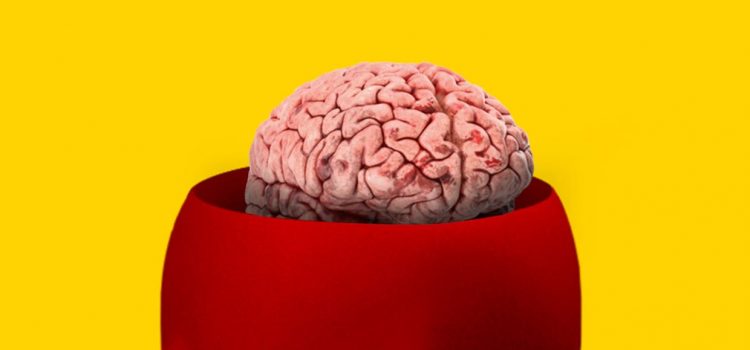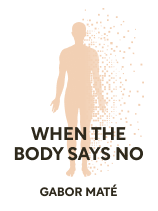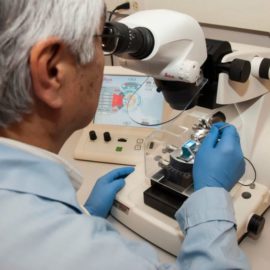

This article is an excerpt from the Shortform book guide to "When the Body Says No" by Gabor Maté. Shortform has the world's best summaries and analyses of books you should be reading.
Like this article? Sign up for a free trial here .
Why is the connection of mind and body important in the medical field? Why does modern medicine separate mind from body?
The Western medicine treats the mind and the body as separate domains (mind-body dualism). According to Dr. Gabor Maté, the author of When the Body Says No, this mindset is holding modern medicine back because the mind can cause disease to the body.
Here’s why the mind-body connection shouldn’t be overlooked when diagnosing and treating illness.
The Mind-Body Relationship
Chronic stress is a psychological condition. But, according to Dr. Maté, modern medical practice is rooted in mind-body dualism, meaning that the body and mind are treated as separate entities with medical doctors treating only the body. He argues that thinking of the mind and body as two separate entities disguises the connection between chronic stress and disease. Researchers tend to miss those connections because of the way they’re defining and understanding stress, as well as their lack of attention to human psychology.
In this article, we’ll discuss the problems with mind-body dualism and the predominant definition of stress. We’ll then look at how Maté understands stress and his explanation of what it actually does to our bodies.
| Cartesian Philosophy and Medicine Although the concept of mind-body dualism can be traced back to ancient Greece, much of modern Western medical thought has its roots in Cartesian philosophy of the 17th century. Descartes’ ideas about the mind and body as distinct entities have been regarded by many as a positive historical turn in medicine, because they challenged the prevailing religious dogma that was stalling medical advancement. Before that time, disease was often attributed to moral failings and supernatural forces, such as demon possession. Human dissection was also forbidden because of religious beliefs that the body had to be preserved intact for the person to ascend to heaven. So, separating the mind and body allowed for these norms and beliefs to be overturned. However, science now shows that the mind and body are inextricably linked. And yet, the practice of treating them separately continues. |
Mind-Body Dualism in Modern Medicine
Mind-body dualism underlies the modern Western approach to medicine. This is evident in the fact that we distinguish medical doctors from psychiatrists and therapists, and they work independently of one another with little to no communication. This is a flawed practice, Maté argues, because there’s no separation between the mind and body—they’re each part of one interconnected whole. He says that medical researchers and practitioners need to put more emphasis on discovering the entire life history of patients.
| Traditional Healing Systems Have Always Been Holistic Although modern medical practice in the West may routinely ignore the connection of mind and body in treatment of illness, many indigenous societies with shamanic traditions have always approached illness from a holistic perspective. Within traditional healing systems around the world, physical, mental, spiritual, social, and environmental aspects of life have long been understood as inextricably intertwined. And they are treated as such by traditional healers, who employ a much more diverse set of remedies and therapies than modern medical practitioners. For example, in a study of the healing practices of the Māori (the indigenous people of New Zealand), researchers describe an extraordinarily complex understanding of the interplay of a variety of elements of life, including: body, mind, spirit, family, tribe, ancestry, land, and knowledge. All of these elements are incorporated into the healing practices of the “Rongoā Māori”—the traditional healing system. |
The Strictly Biological Approach
Maté points out that doctors tend to primarily look for biological “causes” of disease. When they can’t find one, as with most cancers and other serious illnesses, they conclude the disease is “of unknown etiology.” Rarely do they consider a causal origin in the psychology of the human being as the host of the disease.
Maté says there’s also too much importance placed on genetic research. Genes are turned on and off by environment, he says, so environment actually plays a bigger role than our genes do in shaping us. So much is invested in genetic research while the environmental and societal causes of disease are ignored. He points out that even where external or biological/genetic risk factors are identified, those aren’t sufficient explanations. If they were, all smokers would get lung cancer and no non-smokers ever would. He says doctors fail to ask bigger-picture questions, like “why does this patient have this disease at this time?”
| Your Thoughts Affect Your Cells In The Biology of Belief, Dr. Bruce Lipton argues that the environment of our cells matters much more than was previously thought, and our thoughts and mental states have the capacity to alter that environment. He discusses the field of epigenetics, which is the study of the bigger picture of how DNA is expressed according to a variety of factors. These factors include your emotional states, your relationships with others, your sleep and diet habits, and the environment you live in. They also include all these factors as they related to your mother while you were in the womb. |
The Biopsychosocial Approach
In opposition to the strictly biological approach to disease, Maté advocates for a biopsychosocial approach, as mentioned earlier, which entails looking at disease from a biological, psychological, and social perspective. He also advocates for complex interdisciplinary perspectives such as Psychoneuroimmunoendocrinology (PNI): the study of the interconnections between our nervous system, immune system, hormones, and our psychological processes. The interaction between these systems serves to recognize threats, internal and external, and to respond to them in physiological and behavioral ways.
| Tension Myositis Syndrome Maté’s work is influenced by the late Dr. John Sarno, who was a pioneer in research on the connection of mind and body in disease and published several books on the topic between 1982 and 2006. Sarno coined the term Tension Myositis Syndrome (TMS) to refer to any condition in which one’s psychological state causes physical symptoms, such as chronic pain or digestive issues. Fibromyalgia, for example, is one of those conditions which has no identifiable physiological cause, but induces chronic symptoms like debilitating fatigue and widespread pain. Dr. Sarno theorized that TMS symptoms were related to the psychological pressures people live with when they feel the constant need to live up to others’ expectations and then repress their negative emotions. Although much of Dr. Sarno’s work was disregarded by his colleagues and the larger medical community, some physicians today, like Dr. John Sacks, have followed in his footsteps and are actively treating TMS through a variety of psychological therapies and integrative medicine. |
To support his claim that most physicians don’t consider the personal history of their patients, Maté points to a study that found that two-thirds of gastroenterology patients had a history of physical or sexual abuse, and yet their doctor was aware of that history in only 17% of the cases. Additionally, a common theme in the many interviews Maté conducted with his own patients, with a variety of different illnesses, was problematic childhood relationships with parents. This included emotionally distant or unsatisfying relationships, abandonment, sense of loss, and lack of autonomy.
The problem is that these histories take time and diligent attention to extract because the patients are often in denial and have repressed negative memories. In fact, Maté points out, many of them appear to be happy people with wonderful childhoods, so without intentional effort, most doctors will never know about their patients’ painful experiences. (Shortform note: Research also suggests that when doctors encourage patients to tell their life stories, it helps build a relationship of confidence and trust, levels the power dynamic, and allows doctors to develop a more empathetic understanding of the patient. To this end, Columbia University has developed a program in narrative medicine, which trains medical students in this approach to patient care.)

———End of Preview———
Like what you just read? Read the rest of the world's best book summary and analysis of Gabor Maté's "When the Body Says No" at Shortform .
Here's what you'll find in our full When the Body Says No summary :
- How stress can manifest as chronic illness
- How to heal from and avoid stress-related diseases
- Why toxic positivity can make you sick






